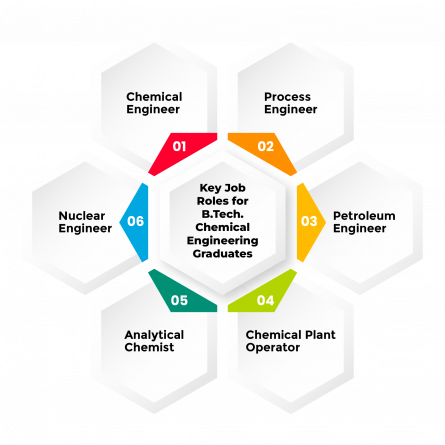B.Tech. Chemical Engineering: The Force Behind Fuels, Pharma & Sustainability

Blog / June 25, 2025
B.Tech. Chemical Engineering ScopeB.Tech. Chemical Engineering Course DetailsYou probably don’t think about it, but chemical engineers have a hand in nearly everything around you.
- The fuel that powers your car
- The clean water you drink
- The medicines in your cabinet
- Even the shampoo in your shower
Behind all of that is someone who understands how raw materials turn into everyday essentials and how to make those processes cleaner, faster, and safer. Their work shapes everything from global manufacturing to the health of local communities.
With this growing demand across industries and a future anchored in sustainability and innovation, B.Tech. Chemical Engineering offers the opportunity to work in these sectors. It is a course that combines scientific precision with practical application and equips you with a deep understanding of core sciences, process design, and technology systems.
Whether you aim to work in energy, pharmaceuticals, food, water treatment, or materials innovation, the B.Tech. Chemical Engineering subjects are structured to give you both technical skills and a real-world perspective.

Real Meaning of B.Tech. Chemical Engineering: Science, Strategy, and Social Impact
B.Tech. Chemical Engineering is a four-year undergraduate course that equips students with scientific knowledge and expertise to develop and optimize industrial processes.
It gives you the scientific depth and practical skills to solve real-world problems across multiple industries, whether it’s building better batteries, scaling up vaccine production, designing water treatment systems, etc.
You’ll be trained to design large industrial plants, optimize systems, reduce waste, and follow safety protocols, all while keeping costs and emissions low. It’s not about textbook theory. It’s about applying science to solve problems across:
- Energy (petroleum refining, battery tech)
- Pharma (vaccine production, chemical synthesis)
- FMCG (cosmetics, packaged foods)
- Environment (water purification, CO₂ capture)
This degree prepares you for frontline roles in sustainability and innovation. B.Tech. Chemical Engineering isn’t about being stuck in a lab mixing colorful liquids. It’s about solving real-world problems in energy, pharmaceuticals, food, and environmental sustainability.
The Multidimensional Role of a Chemical Engineer in Today’s Economy
Chemical engineers are needed in nearly every industry. And that’s not an exaggeration. You’ll be working on:
- Fuel processing in companies like Reliance or Indian Oil
- Pharmaceuticals like Dr. Reddy’s, Cipla, or Biocon
- FMCG brands like Nestlé or Hindustan Unilever
- Waste-to-energy and green hydrogen projects
- Food technology and fermentation science
And these aren’t just boring desk jobs. You’ll design plant layouts. Handle safety audits. Run simulations. Improve energy efficiency. Develop biodegradable plastics.
Eligibility Criteria and Entrance Exams
Let’s talk about the basics. Who can apply for B.Tech. Chemical Engineering? You need to:
- Class 12 with Physics, Chemistry, and Math (PCM)
- Minimum 60-75% marks in 12th
- Entrance exam score
National-Level Entrance Exams
- JEE Main
- JEE Advanced
State-Level Entrance Exams
- MHT CET
- WBJEE
University-Level Entrance Exams
- SNUSAT
|
Parameter |
Details |
|
Course Name |
B.Tech. Chemical Engineering |
|
Course Level |
Undergraduate (UG) |
|
Course Duration |
4 years (8 semesters) |
|
Eligibility |
60-75% in 12th (PCM), varies by college |
|
Entrance Exams |
JEE Main & Advanced, SNUSAT |
|
Admission Process |
Mostly entrance exam-based, few accept merit + PI |
|
Tuition Fee |
Up to 20 lakh rupees |
What You’ll Study in a B.Tech. Chemical Engineering Program
When students look at engineering options, the first thing they ask is, “What will I actually study in this course?”
This program isn’t just about chemistry. It’s an integration of physics, math, chemistry, computer science, and environmental studies. You’ll learn to design large-scale processes, understand energy flow, and handle chemical reactions safely and efficiently.
Here’s what you’ll study in a typical B.Tech. Chemical Engineering course:
1st Year B.Tech. Chemical Engineering Subjects
|
Semester 1 |
Semester 2 |
|
Environmental Studies |
Essentials of Biology |
|
Chemical Principles |
Engineering Mechanics |
|
Mathematical Methods – I |
Introduction to Chemical & Biochemical Engg |
|
Manufacturing Processes |
Introduction to Computing & Programming |
|
Descriptive Engineering Drawing |
Mathematical Methods – II |
|
Introduction to Physics – I |
University-Wide Elective |
2nd Year B.Tech. Chemical Engineering Subjects
|
Semester 3 |
Semester 4 |
|
Fluid Mechanics |
Heat Transfer |
|
Chemical Engineering Thermodynamics |
Mechanical Operations |
|
Material & Energy Balance |
Biochemistry |
|
Mathematical Methods – III |
Chemical Reaction Engineering – I |
|
Material Science & Engineering |
Major Elective 1 |
|
University-Wide Elective |
University-Wide Elective |
|
Core Common Curriculum Courses |
Core Common Curriculum Courses |
3rd Year B.Tech. Chemical Engineering Subjects
|
Semester 5 |
Semester 6 |
|
Process Dynamics & Control |
Mass Transfer – II |
|
Mass Transfer – I |
Transport Phenomena |
|
Chemical Reaction Engineering – II |
Chemical Engineering Laboratory – II |
|
Chemical Engineering Laboratory – I |
Modeling & Simulation of Chemical Systems |
|
Major Elective 2 |
Process Equipment Design |
|
University-Wide Electives |
Major Elective 3 |
|
University-Wide Electives |
University-Wide Elective |
|
Core Common Curriculum Courses |
Core Common Curriculum Courses |
4th Year B.Tech. Chemical Engineering Subjects
|
Semester 7 |
Semester 8 |
|
Minor Project |
Major Project |
|
Chemical Engineering Laboratory – III |
Any Major Elective |
|
Chemical Technology |
|
|
Major Elective 4 |
|
|
Core Common Curriculum Courses |
|
|
Floating Elective |
Industry Tools, Research Platforms, and Skills That Set You Apart
Learning the theory is only half the work. You’ll work with simulation and process design software from early semesters. You’ll be introduced to:
- Aspen Plus: For process simulation
- MATLAB: For complex mathematical modeling
- DWSIM: An open-source chemical process simulator
- AutoCAD: For equipment layout and plant design
You’ll use these tools in lab courses tied to your subjects. Your skills won’t stop at software. By the end of your course, you’ll be confident in:
- Running experiments safely
- Handling industrial control systems
- Working on data analysis for process improvements and
- Communicating with teams and writing technical reports
Practical Experience: Internships, Labs, and Research-Driven Learning
Textbooks won’t teach you everything. Real learning happens when you’re in the lab, on the factory floor, or working on a live project. Here are some of the key labs you will come across during this program:
- Unit Operations Lab
- Mass Transfer Lab
- Chemical Reaction Engineering Lab
- Process Control Lab and
- Chemical Engineering Computational Labs
Each lab links directly to your B.Tech. Chemical Engineering subjects. You apply what you learn. You make mistakes. You fix them. You learn again.
To get industry exposure and learning about real-world applications of chemical engineering concepts, internships are usually done in the third year. These can be in:
- Petrochemical plants
- Pharmaceutical units
- Food processing companies
- Environmental testing labs and
- Research centers like CSIR or BARC
Top Industries That Hire B.Tech. Chemical Engineering Graduates
Manufacturing
- Chemical Manufacturing
- Food and Beverage
- Pulp and Paper
- Textiles
Energy and Resources
- Oil and Gas
- Petrochemicals
- Nuclear Engineering
- Renewable Energy
Pharmaceuticals and Biotechnology
- Pharmaceuticals
- Biotechnology
Environmental Engineering
- Water Treatment
- Waste Management
- Pollution Control
Other Industries:
- Design and Construction
- Microelectronics
- Advanced Materials
- Consulting
Key Job Roles of B.Tech. Chemical Engineering Graduates
- Process Engineer
- Petroleum Engineer
- Environmental Engineer
- Manufacturing Engineer
- Chemical Plant Operator
- Production Manager
- Quality Assurance Engineer
- Analytical Chemist
- Energy Manager
- Research Scientist
- Chemical Engineer
- Nuclear Engineer
- Food Scientist
- Chemical Production Manager
- Design Engineer
Renowned Organizations that Hire B.Tech. Chemical Engineering Graduates
- Reliance
- ONGC
- IOCL
- BPCL
- Cipla
- Dr. Reddy’s
- Sun Pharma
- Hindustan Unilever
- Asian Paints
- Pidilite
- Lupin
- Nestle
- Hindustan Unilever
- ITC
- Adani
- Tata Power
- ReNew Power
- EY
- McKinsey
- KPMG
Salary Expectations after B.Tech. Chemical Engineering
Let’s get to the question that parents always ask first. How much can you earn with a B.Tech. Chemical Engineering degree? Salary depends on your role, company, and skills. But here’s a basic breakdown:
|
Experience Level |
Salary Range (INR) |
|
Freshers (0-2 years) |
4-7 LPA |
|
Mid-level (3-6 years) |
8-15 LPA |
|
Senior-level (10+ years) |
20+ LPA |
|
With M.Tech., MBA, or Abroad MS |
15-30 LPA |
Why M.Tech., Research, or Global Study May Be Worth Pursuing
If you want to specialize or go deep into a subject area, higher studies are a strong option. Many B.Tech. Chemical Engineering graduates take one of three paths:
- M.Tech. in India (via GATE)
- MS abroad (in Germany, US, or Canada)
- MBA or techno-managerial courses for cross-functional roles
M.Tech. in Chemical Engineering
- Environmental and Sustainable Engineering
- Process Design
- Polymer Technology
- Energy Systems
- Nanotechnology
- Biochemical and Bioprocess Engineering
MBA
- Supply Chain
- Business Consulting
- Operations
- Product Management
MS or Ph.D. Abroad
- MS in Chemical Engineering (US, Germany, Canada)
- Ph.D. programs with research funding
Ready to Build a Smarter Future? Shiv Nadar University (Institution of Eminence) Could Be Your Launchpad
Backed by world-class faculty, hands-on research, and a future-focused curriculum, the B.Tech. Chemical Engineering at Shiv Nadar University goes beyond traditional classroom learning. It prepares you for real-world challenges in industries like energy, environment, pharma, food, and sustainability.
Through the School of Engineering, you'll receive hands-on experience, engage with professors who are experts in their fields, and conduct high-impact research that will prepare you for positions in a variety of industries throughout the world.
If you're looking to study B.Tech. Chemical Engineering in a space that values independent thinking, industry relevance, and interdisciplinary depth, Shiv Nadar University is the place where your ambition can thrive.
Conclusion
B.Tech. Chemical Engineering is one of the few degrees that blends creativity, science, and large-scale problem-solving into one powerful career path. From designing cleaner energy systems to building better pharmaceuticals and safer food processes, this program opens doors across industries.
If you’re aiming for a B.Tech. Chemical Engineering program that delivers academic depth, practical skills, and global relevance, Shiv Nadar University offers an environment where your potential meets real opportunity.
FAQs
Is B.Tech. Chemical Engineering only for students who are good at Chemistry?
No. It blends chemistry with physics, math, and problem-solving. If you're strong in logic and systems thinking, you're ready.
Can I work in software or consulting after B.Tech. Chemical Engineering?
Yes. Many chemical engineers work in data analytics, business roles, and software for process automation.
What is the scope after B.Tech. Chemical Engineering in India?
You can work in pharma, FMCG, energy, water treatment, research, etc, or also pursue higher studies or go abroad.
What is the B.Tech. Chemical Engineering eligibility for top colleges?
Most require 12th with PCM and 60-75% marks. Exams like JEE are accepted by most of the colleges in India.